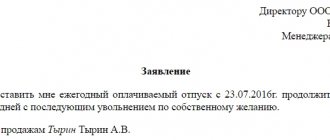Civil service requires the application of standard labor law norms. This also applies to issues related to dismissal from the civil service. This is permitted at the initiative of either party. In this case, the employer is obliged to comply with the procedure established by law. It should be understood that allowing a violation of the procedure for dismissal from the civil service can lead to the recognition of such a decision as illegal.
In addition, termination of employment relations with an organization at one’s own request imposes a number of restrictions on the employee himself. But this depends on the specific circumstances of the termination of legal relations with the employer in the civil service.
Legislative basis for the dismissal of civil servants
Expert commentary
Kamensky Yuri
Lawyer
Federal Law No. 79-FZ of July 27, 2004 is devoted to the issues of regulation of the civil public service in the Russian Federation. The latest changes to it came into effect on January 1, 2020. Standard situations of dismissal of civil servants are subject to Articles 80 and 140 of the Labor Code of the Russian Federation. However, the specifics of their use for this category of persons are described in Law No. 79-FZ.
In particular, the general grounds for termination of a contract and termination of official activities of civil servants are the cases established in Article 33. Articles and this law are devoted to the specifics of interrupting labor relations in accordance with the agreement of the parties, at the request of civil servants and at the initiative of the employer. It also describes contract termination situations:
- due to the occurrence of unforeseen circumstances (force majeure);
- upon loss of Russian citizenship.
- due to loss of trust by the employee (Article 59.2).
Procedure for dismissal from civil service
To complete the dismissal procedure, the employee must personally appear at the civil service department (HR department), where he submits a resignation letter and other required documents, or receives a dismissal order.
Next, he submits the cases in accordance with each item of the bypass sheet and hands over the completed bypass sheet. After this, he is given a memo on official conduct and documents on dismissal.
Documentation
- statement of desire to resign;
- dismissal order;
- bypass form;
- memo on compliance with the requirements for official conduct of state civil servants;
- employment history.
Statement
The text of the application for dismissal of a civil servant does not have any special differences and is filled out in accordance with standard rules personally by the applicant.
Application form download:
Application for dismissal of a civil servant
Order
This document, just as in a standard case of dismissal, is drawn up according to the unified T-8 form, or according to the form established by the rules of office work in a government agency.
Form of dismissal order (form T-8)
Registration of a work book and personal card
An entry about the dismissal is made in the work book of the dismissed person, indicating the reason, confirmed by reference to the provisions of the legislative act.
Example of an entry in a work book:
Information about the employee’s dismissal, indicating the reasons, is entered into the civil servant’s personal card - the entry from the labor record is copied.
Dismissal of civil servants on their own initiative
The specifics of dismissal depend on what contract is concluded with the civil servant. Depending on the duration of the employment relationship, the contract may be open-ended or valid for a specified period.
An employee can only terminate an open-ended contract freely at his own request. To do this, you should notify the employer of your departure two weeks in advance by submitting a statement to management. During the last two weeks of work, the employee must transfer all official files, collect signatures on the worksheet, receive the final payment and work book. Previously, the management, together with the personnel service, must issue an order for dismissal at one's own request. The date of dismissal specified in the order must coincide with the last day of work of the employee.
Important! If the motivation for dismissal was a valid reason that made it impossible to continue service, for example, the need for constant care of a close relative, then the contract must be terminated on the day specified by the employee without working off.
A fixed-term contract can be terminated at the initiative of the employee earlier than the specified period only for a good reason. For example, he can resign early if he has an illness that does not allow him to perform his duties. The law does not contain a complete list of valid reasons for early termination of a contract. Therefore, each situation is considered by the management of the government agency individually. If an employee is denied early dismissal, he can appeal to a higher authority and even to court.
Is work needed?
The Law “On the State Civil Service of the Russian Federation” in Article 39 provides for the desire of the civil servant himself as the basis for termination of the contract.
In fact, the legislation does not contain such a thing as “work before dismissal.” However, the condition for dismissal at the initiative of a civil servant is that he must give advance warning to the employer's representative; the warning period is set at 2 weeks.
During this period, the employee has the right to change his mind and withdraw the submitted application. In addition, a period is given to the person to transfer cases, sign a bypass sheet, etc.
However, if the parties to the service contract come to mutual agreement, this period may be reduced, and the employee may be dismissed on any day on which he agrees with the employer's representative. In addition, there is no need to comply with the deadline established by law in the following cases:
- a civil servant cannot continue to perform official duties for a good reason (enrollment in an educational institution, moving to another area, retirement, etc.);
- the employer's representative commits violations of the law.
In the above cases, the contract must be terminated on the date specified by the employee.
Termination initiated by the hiring party
Termination of contractual relations at the initiative of the employer occurs only if there are compelling reasons. An employee may be fired for the following reasons:
| Inconsistency of a civil servant with his position |
|
| Constant failure to fulfill one's duties, or a conflict of interest with the employer | Since every civil servant has a job description that he must comply with, this makes it possible to monitor his actual work and the quality of its implementation. An employee can be dismissed for failure to fulfill the full scope of assigned duties or for performing them in violation of the law, if there are repeated measures of influence in the form of comments, reprimands and other disciplinary sanctions that did not have the desired effect. |
| Committing a gross violation of labor discipline established by instructions | This applies not only to generally accepted violations affecting all employees: absenteeism, coming to work in a state of alcohol, disclosing state secrets, committing theft, gross violation of safety regulations, but also specific guilty actions relating to civil servants:
|
Dismissal of an employee from his position
In the legislation of the Russian Federation, there are two concepts regarding the termination of official duties of a civil servant, which should not be confused. These include his release from his position and official dismissal.
Expert commentary
Gorchakov Vladimir
Lawyer
If an employee is released from his position, the employment relationship is not interrupted and, in accordance with Article 39 No. 79-FZ, he is required to be included in the reserve, although the contract is interrupted. When an employee is dismissed, the contract is canceled, accompanied by a complete termination of the relationship with the employer.
Removal from office may be accompanied by the following circumstances:
- conscription of an employee for military service;
- appointing him to a public position, for example to perform trade union duties;
- due to retirement;
- force majeure events: disasters associated with natural phenomena, local military actions, etc.
- An employee may also be relieved of his position due to staff reduction.
When dismissed at the will of the employer, certain circumstances require him to perform certain actions:
- when the dismissal is due to the employee’s inadequacy for the position he occupies, then before terminating the contract, the employer is obliged to offer him a position corresponding to his business qualities;
- if an employee refuses the offered position, he must formalize his refusal in writing;
- if a civil servant is released from his position and assigned to the reserve, and for three months he does not begin to perform duties in the new position offered to him, then he is excluded from the personnel reserve and then dismissed;
- upon dismissal due to the employee’s poor health, which does not allow him to fully perform his duties, as well as in connection with the death of the employee, the basis for termination of the contract is considered to be a reason that does not depend on the wishes of the parties;
Important! A civil servant hired for a position on a probationary period may be fired during the probationary period if he is not satisfied with the employer, because he does not meet the requirements.
Fixed-term service contract
The service contract is concluded for a period of one to 5 years. These terms are the minimum and maximum limits. The contract itself must be concluded with any person who enters government service, including a civilian position.
The contractual service basis is governed by the need for professionals who can perform the duties.
When starting work in a government agency, a person falls under special relations of an official-legal nature, which differ from normal labor practice.
After the conclusion of the contract, a status of special legal significance is established, which regulates the established rights, obligations, restrictions, as well as monetary reward, for example, compensation.
In fact, any civil servant receives additional social guarantees from the state.
It is important to know! The range of service-type relationships is very large, so it cannot be fully regulated by ordinary labor legislation. For this purpose, a service contract has been introduced, which fills the gaps.
By law, a service contract can be of two types: fixed-term and regular. A fixed-term contract is concluded strictly when the term cannot be indefinite. This applies to filling a position and other options of a similar nature.
Read on the topic: Peculiarities of bringing state and municipal employees to disciplinary liability
Payments to civil servants upon dismissal
On the day of dismissal, the civil servant receives his work book, as well as the requested certificates about the amount of his salary in the last period of work. In addition, the dismissed person is required to pay the due amounts of the final settlement. Upon dismissal at the request of the civil servant himself, the employer must pay him:
Salary
The salary of the employee, in the form of:
- assigned monthly salary;
- bonus paid for length of service;
- additional payment due for special service conditions;
- allowances for working with classified information of state importance;
- bonus assigned for performing special tasks.
Compensation
The maximum amount of assistance should not exceed three monthly salaries. When a civil servant works in a position for more than 11 months, he is required to pay vacation pay in full. Also, vacation pay is paid in full when employees perform duties for 5.5 months or more, if the dismissal occurs:
- upon liquidation of a state institution;
- when joining the army;
- when staffing is reduced;
- when transferred to service in another government agency.
Additional compensation payments
The law provides for a number of special compensations paid for certain reasons for dismissal.
| Four times the monthly salary is paid upon dismissal of an employee: | The employer is obliged to pay two weeks' salary in the event of dismissal: |
|
|
Entitled payments
When an employee is terminated, the employer must make all appropriate payments. If we are talking about leaving service of one’s own free will, then the list includes:
- wages for the time actually worked until the termination of the employment relationship;
- compensation for unused vacation (proportional to the number of days of service);
- material assistance due to an employee and not used by him.
No severance pay or other additional payments are due in case of voluntary dismissal. An employee is entitled to them only in the event of layoff or liquidation.










